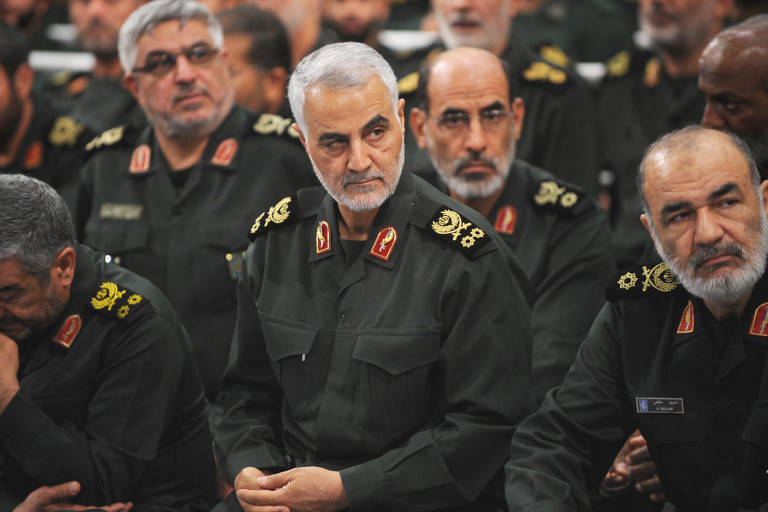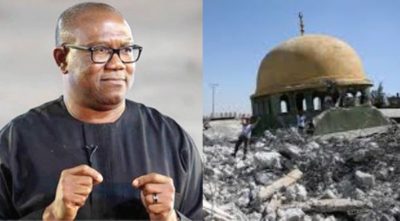“Qassem Suleimani’s death could mark the most dramatic escalation of the Middle East conflict since the Iraq War.”
In what could mark the most dramatic escalation of conflict in the Middle East since the Iraq War, a U.S. airstrike on Thursday killed one of Iran’s most powerful military leaders, Maj. Gen. Qassem Suleimani.
The reported death of Suleimani, a leader in Iran’s Islamic Revolutionary Guard Corps and the head of the secretive Quds Force, which conducts military operations in the region, came a day after Iranian-backed militias attacked the U.S. Embassy in Baghdad in a series of violent protests. Those demonstrations were considered retaliation by Tehran for a previous U.S. airstrike that on Sunday killed 25 fighters of Kataib Hezbollah, an Iran-backed militia in Iraq. The U.S. military said that the earlier strike was itself a retaliation for the killing of a U.S. contractor at an Iraqi military base.
U.S. officials Thursday night confirmed reports on Iraqi television that Suleimani was killed in a U.S. airstrike on Baghdad’s international airport. The Defense Department said in a statement that Suleimani was targeted in part because he “orchestrated attacks on coalition bases in Iraq over the last several months,” including the one that cost the life of the contractor, and that he had “also approved the attacks on the U.S. Embassy in Baghdad that took place this week.”
“At the direction of the President, the U.S. military has taken decisive defensive action to protect U.S. personnel abroad by killing Qasem Soleimani, the head of the Islamic Revolutionary Guard Corps-Quds Force, a U.S.-designated Foreign Terrorist Organization,” the Pentagon statement said.
The statement said that Suleimani “was actively developing plans to attack American diplomats and service members in Iraq and throughout the region. General Soleimani and his Quds Force were responsible for the deaths of hundreds of American and coalition service members and the wounding of thousands more.”
Some experts suggested that what had been, until now, a low-level war between the United States and Iran could soon explode. “We are moving into a period where there is a strong possibility of escalating war and direct conflict between the United States and Iran. The Middle East is already in flames from conflict and large-scale protest movements. It may now get much, much worse,” Seth Jones, an expert on Middle East extremism and unconventional warfare at the Center for Strategic and International Studies, told Foreign Policy.
“First, the attack eliminates Iran’s most important military figure. Since at least the Iran-Iraq War, Iran has focused its foreign policy on building its asymmetric capabilities—particularly the IRGC-Quds Force. Suleimani has spearheaded Iran’s efforts to build upwards of 280,000 fighters in Yemen, Syria, Iraq, Lebanon, Afghanistan, and Pakistan—and to expand Iran’s power in the Middle East. Suleimani has personally overseen Iran’s expansion, creating a cult of personality throughout the region. His death will be a serious blow to Iran’s asymmetric strategy,” Jones said.
“Second, the death of Suleimani will likely trigger a dangerous escalation of the conflict between Iran and the United States. Until now, military conflict between Iran and the United States has largely been indirect and has involved U.S. economic sanctions and military attacks against partners, such as Iranian strikes against Saudi critical infrastructure, Iranian sabotage of commercial ships, Iranian mines against Japanese and Norwegian tankers.”
Reuel Marc Gerecht, a former CIA official and Iran expert who takes a hard-line view of the regime in Tehran, praised U.S. President Donald Trump for ordering the attack, telling Foreign Policy: “They will strike back. The only question is choosing a target. Probably in Iraq. I suspect we had intercept on IRGC planning against U.S. forces, and Trump went for it. Bravo to him.” He added that Tehran will be rocked by what was “an enormous loss for them. Suleimani was in a class by himself: the clerical regime’s most cosmopolitan killer.”
But Iranian Foreign Minister Mohammed Javad Zarif, in a tweet, called the U.S. strike an “act of international terrorism” that had assassinated “THE most effective force fighting Daesh (ISIS), Al Nusrah, Al Qaeda et al,” and an “extremely dangerous & a foolish escalation.”
The U.S. action marks a dramatic escalation by Trump, who for many months has signaled that he wants to withdraw from the Middle East. Last September, after announcing the United States was “locked and loaded” for attack, Trump declined to respond militarily to a devastating attack on Saudi Arabia’s oil infrastructure blamed on Iran. He also stepped back from a planned strike following the shootdown of a U.S. drone, disconcerting the Israelis and other hard-liners.
But in recent days, the administration has stepped up its rhetoric and readiness. Earlier Thursday, Secretary of Defense Mark Esper warned that the United States might take preemptive military action if it received warning that Iran or its proxy forces were planning further strikes on U.S. interests in the Middle East.
“We’re prepared to do what is necessary to defend our personnel and our interests and our partners in the region,” Esper told reporters at the Pentagon. He added that Washington had “indications” of additional Iranian provocations.
Some critics, however, worried that the strike meant a whole new war in the region. “A president who vowed to keep the United States out of another Middle Eastern war has in effect just issued a declaration of war,” said Robert Malley, president of the International Crisis Group. “A strike that the administration claims was intended to deter Iranian attacks is almost certain to trigger far more of them. Qaaem Soleimani’s death is undoubtedly a very serious blow to Iran. But it also is a very serious blow to any hope for regional de-escalation.”
Trump began his efforts to confront Iran almost as soon as he became president, pulling out of the nuclear agreement negotiated by his predecessor, Barack Obama, and and by Foreign Minister Zarif, and imposing tough new sanctions on Iran that have crippled its economy. Trump has, until now, signaled his willingness to negotiate with Tehran and has been restrained in his use of military force.
Gerecht said of Trump: “I didn’t think he had the intestinal fortitude for this. That Suleimani is dead, and we killed him, shows that we can still deliver condign punishment. American soldiers are applauding from heaven. Whether the administration is prepared to escalate, I do not know. We will find out.”
Suleimani was considered the key figure in organizing Iranian influence operations in Iraq and during the Syrian civil war. As the correspondent Dexter Filkins wrote in a detailed profile in the New Yorker in 2013, Suleimani’s task was to “reshape the Middle East in Iran’s favor, working as a power broker and as a military force: assassinating rivals, arming allies, and, for most of a decade, directing a network of militant groups that killed hundreds of Americans in Iraq.” Until recently, however, Suleimani has only been sanctioned by the United States.
U.S. Sen. James Risch, the Republican chairman of the Senate Foreign Relations Committee, also praised Trump’s action. “Congratulations to President Trump on his decisive action and the successful outcome,” Risch said in a statement. He said Suleimani’s death “presents an opportunity for Iraq to determine its own future free from Iranian control.”
Others suggested the act might amount to an unnecessary provocation. “Soleimani was an enemy of the United States. That’s not a question,” Democratic Sen. Chris Murphy, the ranking member of the Senate Foreign Relations Committee, wrote on Twitter. “The question is this – as reports suggest, did America just assassinate, without any congressional authorization, the second most powerful person in Iran, knowingly setting off a potential massive regional war?”
Iraqi TV reported that along with Suleimani the strikes killed Abu Mahdi al-Muhandis, the deputy commander of Iran-backed Iraqi militias known as the Popular Mobilization Forces.
Ironically, Washington has previously credited Suleimani’s militias with helping to defeat the Islamic State in Iraq. Senior Trump administration officials from the State Department, Pentagon, and intelligence community were scheduled to give classified briefings to the Senate on Friday before the news broke, according to congressional aides familiar with the matter.




